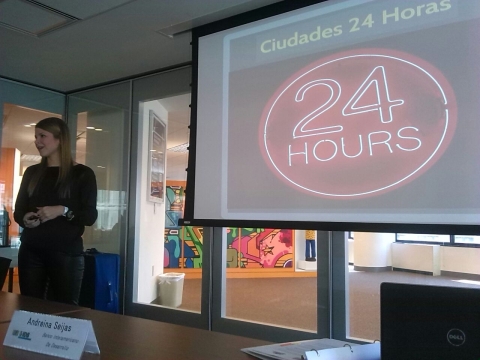
Andreina Seijas of IDB's Emerging and Sustainable Cities Initiative explains how 24-hour cities can improve citizen security.
Twelve journalists from nine Latin American countries spent a week at the Inter-American Development Bank (IDB) in Washington, D.C., learning about crime and citizen security as part of the International Center for Journalists’ (ICFJ’s) “Can Crime Be Prevented in Latin America?” program. The initiative, hosted and funded by IDB, began with a six-week online course that attracted 94 participants. From that group, ICFJ selected 12 journalists to visit the United States.
In Washington, the journalists attended sessions on crime and security-related topics at the IDB, the World Bank and the White House. They also covered a less conventional topic: the social and economic benefits of 24-hour cities.
Andreina Seijas, an expert with IDB’s Emerging and Sustainable Cities Initiative, explained how cities in Latin America and elsewhere are boosting economic activity by adopting a round-the-clock approach to urban life. Seijas said the approach is especially appealing to younger generations who rely more on technology and have more flexible schedules.
In addition to the economic benefits (increased employment, tax revenues and tourism levels), Seijas said 24-hour cities can improve citizen security. She said round-the-clock policies create safe, populated spaces in urban areas that would otherwise be unused. The benefits would include more regular activity, better illumination and extended schedules for public transport.
Last November, Buenos Aires opened a number of its museums for a full 24 hours. La Noche de los Museos, or the Night of the Museums, was designed to promote the nighttime economy and cultural activities in a city where crime is a serious problem.
In the UK, the government has implemented a Purple Flag award award to cities that encourage evening and nighttime economies. The award is designed to promote tourism by rewarding cities that support safe transportation and art and cultural attractions held at night.
Twenty-four percent of Latin Americans consider crime to be the most important issue in the region, making citizen security a regular topic in the media. The region’s 2012 murder rate of nearly 24 per 100,000 citizens was among the world’s highest. One in five Latin Americans report having been the victim of a robbery over the past year.
The IDB fellows’ program was designed to deepen journalists’ understanding of crime and violence in Latin America and improve coverage of the issues.